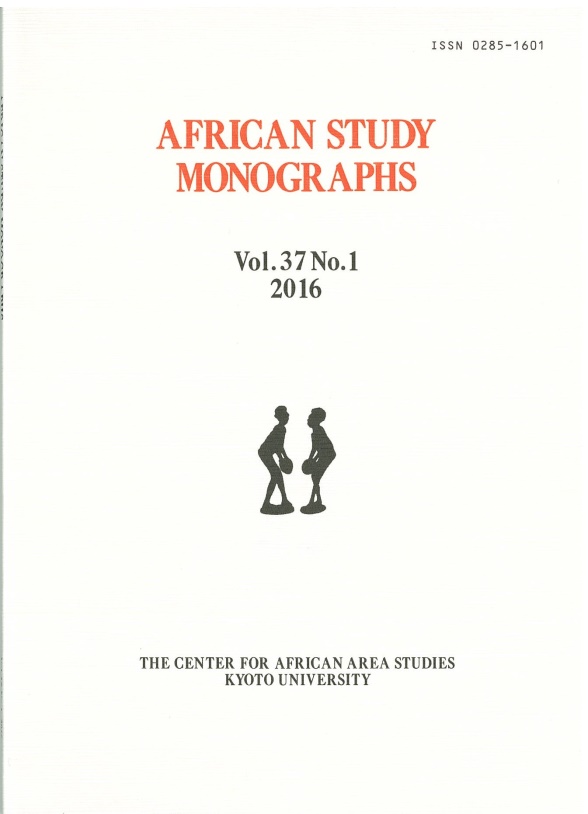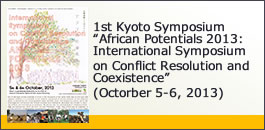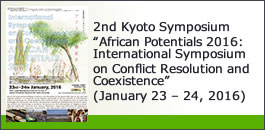[15th Public Workshop / 7th Meeting of Research Unit on Economic and Development] “Business Expanding of Beer Industry in East Africa” Akio Nishiura (Soka Univ.) (October 17, 2013)
Date: October 17, 2013
Venue: Inamori Foundation Memorial Bldg. (Inamori Center), Middle-sized Room
Program
Presenter: Akio Nishiura (Soka Univ.)
Title: “Business Expanding of Beer Industry in East Africa”
Abstract
This presentation focused on the beer industry development of Uganda to clarify the new economic conditions in East Africa. Foreign investment stimulates the development of beer industry in Uganda. The industry development promoted the local procurement of raw materials, barley from the contract farmers.
[14th Public Workshop / 7th Meeting of Research Unit on Livelihood and Environment] “Conflicts among residents over commons; cultivated area expansion in the seasonal damp ground in Tanzanian farm village.” Kana Yamamoto (JSPS Research fellow / Kyoto University) (June 20, 2013)
Date: June 20, 2013. 15:00-17:00
Venue: Middle-sized seminar room, 3F Inamori Center, Kawabata Campus, Kyoto University
Program
Title: Conflicts among residents over commons; cultivated area expansion in the seasonal damp ground in Tanzanian farm village
Presenter: Kana Yamamoto (JSPS Research fellow/ Kyoto University)
Abstract
Most of the damp grounds distributed over Africa are existed as the commons that local residents commonly use, but recently cultivated area expands and there are tendencies that households start enclosing the damp ground. Turning damp grounds into cultivating fields yields an interest among local residents and often leads to conflicts. In this presentation, showing the process and the background of expansion of cultivating field in the seasonal damp ground in Tanzanian farm village, I clarify the figure of people trying to find the way of using the commons that is suitable for the present conditions while they disputes over the use of surrounding environment.
[3rd Seminar on Conflict and Coexistence in Africa] (May 11, 2013)
Date: May 11, 2013. 15:00-17:00
Venue: Inamori Foundation Memorial Bldg, Middle-sized Meeting Room, Kyoto
Program
15:00-15:40
Fukui Miho (Ochanomizu University)
Research on Gender-based Violence (GBV) in the Post-conflict Phase:
Integrating Human Security in its Response
15:40-16:20
Hisada Shinichiro (Kyoto University)
Applying P3DM for Clarification of Multifactor Relationship of Land Disputes
:A Case Study of Highland Agrarian Ali in Southwestern Ethiopia
16:20-17:00
Ideue Kazuyo (Kobe University)
A Study of Capital Market and Corporate Finance in Africa: An Analysis of the Capital Accumulation Process of Sugar Industry and the Capital Transfer in Mauritian Industrialization
Summary
Research on Gender-based Violence (GBV) in the Post-conflict Phase:
Integrating Human Security in its Response
Fukui Miho (Ochanomizu University)
This research specifically deals with Gender-based violence(GBV) committed by members of the international society, including UN and NGOs, to its beneficiaries in a post-conflict phase and searches for a better response mechanism which involves prevention, punishment (both legal and administrative) and victim support. The main aim is to integrate human security to its response at an organizational level and promote a victim centred approach. A field research based on interviews and monitoring of the programme in Sierra Lone and Liberia brought some findings on the GBV response lead by the government and UN. In Sierra Leone, the GBV victim support program still faces the same challenge which they faced in the post-conflict phase, but the National Committee against GBV which inherited a very clear anti-GBV message from the international society succeeds on promotion of lowering the rate of female genital mutilation/cutting (FGM/C). In Liberia, UN lead GBV response shows a new form of response mechanism. By ensuring a victim support from the post-conflict phase, African “potential” for human security even in the following development phase would be explored. This is an attempt to secure a support to all victims regardless of the legal status of a perpetrator and the organization which a perpetrator belongs to.
Applying P3DM for Clarification of Multifactor Relationship of Land Disputes:
A Case Study of Highland Agrarian Ali in Southwestern Ethiopia
Hisada Shinichiro (Kyoto University)
A Study of Capital Market and Corporate Finance in Africa: An Analysis of the Capital Accumulation Process of Sugar Industry and the Capital Transfer in Mauritian Industrialization
Ideue Kazuyo (Kobe University)
Until independence in 1968, Mauritius was a British crown colony. Prior to its capture by Britain in 1810, the island belonged to France and Holland. At the time of independence, the Mauritian industrial structure depended almost exclusively on sugar export and the sugar industry was the backbone of the country. However, the country was face with a high level of population growth rate and serious deterioration on its fiscal conditions. Following these reasons, the economic diversify was required
After the introduction of the establishment an export processing zone (EPZ) in 1970, Mauritius was called “Mauritian Miracle” in terms of success of export-oriented industrialization which led to high economic growth among African countries.
The colonial rule and the existence of foreign capital certainly impacted the population characteristic and economic structure, and also it is assumed that the sugar industry which inherited from the colonization of French period impacted the formation of Mauritian economic development. Therefore, sufficient accumulation of sugar industry also would be the source of investment in the development of the Mauritius EPZ.
The purpose of this study is to investigate such assumption by analyzing the evolution of sugar industry and the connection with EPZ sector and financial sector. Besides the based on the above result, the way of financial system which is not only for corporate finance for growth but also for inclusive development are discussed in considering the development of capital market in Africa where the ownership structure of companies are mostly concentrated.
[13th Public Workshop / 10th Meeting of Culture and Society Research Unit] “Fragmentation, Cooperation and Power: The Institutional Dynamics in Natural Resource Governance in North-western Namibia” (May 14, 2013)
Date: May 14, 2013 (Tue.), 14:30 – 16:30
Venue: Seminar Room (No. 318), Inamori Center, 3F
“Fragmentation, Cooperation and Power: The Institutional Dynamics in Natural Resource Governance in North-western Namibia”
Michael Bollig (Institute for Social and Cultural Anthropology, Vice-Rector for International Relations, Diversity and Academic Career, Universität zu Köln)
Program
14:30 – 16:30 Michael Bollig (Institute for Social and Cultural Anthropology, Vice-Rector for International Relations, Diversity and Academic Career, Universität zu Köln)“Fragmentation, Cooperation and Power: The Institutional Dynamics in Natural Resource Governance in North-western Namibia”
Abstract
Contemporary theoretical accounts of common pool resource management assume that communities are able to develop institutions for sustainable resource management if they are given security of access and appropriate rights of management, and if they can develop institutions that prevent free-riding and over-exploitation. Rural communities have been conceptualized as cornerstones of sustainable and efficient resource management: as a viable alternative to privatizing resources or putting them under state administration. In recent years comprehensive legal reforms of communal rural resource management in Namibia have sought to create an institutional framework linking sustainable land use and rural development. The state, however, ceded rights to communities in an ambiguous and fragmented manner, creating a number of instances of overlapping property rights. Nowadays communities grapple with the challenge of instituting these “new commons”, which are grafted onto earlier communal institutions, but also shaped by state legislation and the engagement of non-governmental organizations. This presentation describes the process of institutional development, focusing on the challenges arising from the necessity to define group boundaries, the issues arising from monitoring and sanctioning within a newly defined common property regime, and the ideological underpinnings of different trajectories of community based natural resource management (CBNRM).[12th Public Workshop / 9th Meeting of Culture and Society Research Unit] “The Urban Working Class Dimensions of Zimbabwe’s War Veterans Revolution: New Empirical Evidence from the Informal Sector” (March 19, 2013)
Date: March 19 (Tue.), 2013, 16:00 – 18:00
Venue: Small Seminar Room-2, Inamori Center 3F.
“The Urban Working Class Dimensions of Zimbabwe’s War Veterans Revolution: New Empirical Evidence from the Informal Sector”
Wilbert Zvakanyorwa Sadomba (Department of Sociology, University of Zimbabwe)
Program
16:00 – 18:00 Wilbert Zvakanyorwa Sadomba (Department of Sociology, University of Zimbabwe)
“The Urban Working Class Dimensions of Zimbabwe’s War Veterans Revolution: New Empirical Evidence from the Informal Sector”
Abstract
The revolution that has been spearheaded by Zimbawean veterans of the 1970s guerrilla war has pushed Africa’s political, social and economic struggles to new horizons. It raises fresh philosophical questions about postcoloniality of and in Africa. The revolution, rooted as it is in the liberation struggle that culminated in a protracted war from the1960s to 1979, lay a political foundation that continues to shape philosophical thought and social practice of this small nation, with ripple effects on the whole continent and perhaps other developing nations across the world. The essence of this revolution is its combined challenge of neo-colonialism and imperialist domination supported by settler economic hegemony. There are four distinct rural and urban movements on which this revolution was anchored, viz. the land, informal mining, housing cooperatives and informal industry and trade movements. A combination of the two books focus on the land and housing cooperatives. Of the five the land movement was the most popularised and internationalised but it was by no means the most dramatic or even the most sustainable but on the contrary it was the most vulnerable to neo-colonial forces and imperialist attacks. However it was also the most symbolical. Current studies on the informal industrial movement add more empirical evidence to this theorisation. Future studies will pursue informal mining as part of the war veterans revolution. The address will illustrate how the war veteran revolution generated a centrifugal force that span the movements and it will discuss relative successes and failures of these in the current political stalemate of the country.
[11th Public Workshop / 8th Meeting of Culture and Society Research Unit] “Human Rights NGOs and Strategies of Public Justice in Sub-Saharan Africa” (February 2, 2013)
Date:Feb.2, 2013 15:00-17:00
Venue: Inamori Foundation Memorial Bldg.
Program
15:00-17:00 Ronald Niezen (Department of Anthropology, McGill University)
“Human Rights NGOs and Strategies of Public Justice in Sub-Saharan Africa”
Abstract
The most significant influence on states that moves them in the direction of human rights compliance involves campaigns of public exposure and protest intended to apply reputational costs to violators of rights. The effectiveness and social consequences of these “politics of shame” vary considerably according to the nature of NGO networks and public participation in justice lobbying. This can be understood by comparison between the claims and strategies of the Tuareg in West Africa and those of the Umoja Women’s village among the Samburu of Kenya. The extension of the international movement of indigenous peoples into sub-Saharan Africa presents an opportunity to consider emerging processes of rights compliance, influenced by trans-national public engagement with distant public audiences.
[10th Public Workshop / 4th Meeting of Research Cluster on Southern Africa] “Creativity of the African Farmers: Living strategy of Angolan immigrants living in Western Province, Zambia” Rumiko Murao (Tokyo University of Foreign Studies) (January 24, 2013)
Date: January 24, 2013. 15:00-17:00
Venue: Large-sized seminar room, 3F Inamori Center, Kawabata Campus, Kyoto University
Program
Title: Creativity of the African Farmers: Living strategy of Angolan immigrants living in Western Province, Zambia
Presenter: Rumiko Murao (Tokyo University of Foreign Studies)
Abstract
Angolan immigrants in farm village of Western Province, Zambia are voluntary refugees who have left their country because of a civil war. After their immigrations from Angola, their lives, especially land uses, are regulated in the context of political and economic change at national and global level. In this presentation, I examine characteristics to be seen in the African farmers under the political and economic change by focusing on creativities that can be seen in the living strategies of the Angolan immigrants.
[9th Public Workshop] “Taxing Times: Informal Economies and Religious Conflict in Northern Nigeria” (Co- organized by the 9th Kyoto University African Studies Seminar (KUASS)) (November 16, 2012)
Date: November 16, 2012. 15:00-17:00
Venue: Middle-sized seminar room, 3F Inamori Center, Kyoto University
Program
“Taxing Times: Informal Economies and Religious Conflict in Northern Nigeria”
Dr. Kate Meagher (London School of Economics)
Abstract
This lecture is based on research carried out in northern Nigeria in late 2011, just before the acceleration of terrorist bombing. It examines the role of informal economic activities, which in Nigeria tend to be based on ethnic and religious forms of organization, in exacerbating or mitigating religious conflict. The lecture focuses on three categories of informal activities, characterized by economic interdependence, competition and value conflicts between Christian and Muslim enterprise groups. It examines how the nature of informal economic relations influences inter-religious relations between each of these three categories of enterprises, and considers how government policy contributes to strengthening or undermining positive tendencies, or exacerbating negative processes. In the process, the lecture reveals the underlying basis of religious tension in northern Nigeria, and the social resources available to address it.
[8th Public Workshop / 5th Meeting of Research Unit on Livelihood and Environment] “The formation of the Tanzanian awareness” Toshimichi Nemoto (Japan Tanzania Tours Ltd.) (November 15, 2012)
Date: November 15, 2012. 15:00-17:00
Venue: Room 318, 3F Inamori Center, Kawabata Campus, Kyoto University
Program
Title: The formation of the Tanzanian awareness
Presenter: Toshimichi Nemoto (Japan Tanzania Tours Ltd.)
Abstract
The borderline in African Continent, where is multiracial, was designated based on Berlin Conference of 1885. While each colony tried to become independent aiming at the formation of one-nation-state, many of them repeatedly experienced ethnic conflicts. However, Tanzania has not experienced major ethnic conflicts or a civil war since its independence 50 years ago. This presentation looks back the recent contemporary history of Tanzania since the mid-19th century.
[2nd Seminar on Conflict and Coexistence in Africa] (October 20, 2012)
Date: October 20, 2012. 13:30 – 18:00
Venue: Inamori Foundation Memorial Bldg, Small-sized Meeting Room, Kyoto University
Program
13:30 – 14:35: Hideyuki Okano (Osaka University)
Role of the State and Maintenance of Local Social Orders in Republic of Sierra Leone
14:35 – 14:45: Break
14:45 – 15:50: Shinichi Fujii (Osaka University)
Anthropology of/and Conflict Resolution: Cases of ‘Ethnic Violence’ in Solomon Islands
15:50 – 16:00: Break
16:00 – 17:05: Miki Ito (Osaka University)
Ethnic Groups and their Subsistence Activities in Niger Inner Delta
17:05 – 18:00: General Discussions
Summary
Role of the State and Maintenance of Local Social Orders in Republic of Sierra Leone
Hideyuki Okano (Osaka University)
Nothing can be free from state systems today, and not excepting how local social orders are maintained. This presentation discusses how the state intervened in the process of exhaustion and break–up of social orders in rural villages in Sierra Leone, and what kind of parts the state took in the process of their recovery.
Anthropology of/and Conflict Resolution: Cases of ‘Ethnic Violence’ in Solomon Islands
Shinichi Fujii (Osaka University)
This presentation first reviews how anthropological studies dealt with conflict resolution. Then, resolution process of ‘ethnic conflict’ in Solomon Islands is investigated. Finally, this presentation explores the possibility of/and conflict resolution, reviewing reconstruction process of social orders in Solomon Islands.
Ethnic Groups and their Subsistence Activities in Niger Inner Delta
Miki Ito (Osaka University)
This presentation focuses on the multiple ethnic groups in Niger Inner Delta, especially the relationships between pastoral Fulbe and its agricultural neighbors. It explores how they shared natural resources, how they resolved conflicts, and how their relationships have changed during these 30 years, responding repeated droughts and changes in market relations.


 Exploring African Potentials, Mila Special Issue
Exploring African Potentials, Mila Special Issue
